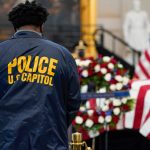House Minority Leader Kevin McCarthy on Thursday joined his Senate counterpart in entertaining potential reform of the 135-year-old law that Donald Trump allies used to fuel their case against certification of the 2020 election.
When asked about the prospects of a bipartisan revision of the Electoral Count Act, pitched by members of both parties as a meaningful response to the Jan. 6 riot by Trump supporters, McCarthy told reporters he sees "nothing wrong" with exploring the idea.
“Just like any bill out there, in every Congress, we look at an old piece of law. So you can always modernize it and others,” the California Republican said at his weekly press conference. “There’s nothing wrong with looking at any piece of legislation. I would think we’d look at a lot of things and make things accountable.”
The comments, though mild, are particularly notable given that 139 House Republicans, including McCarthy, voted to object to certifying Trump’s loss. They also come as GOP and Democratic senators begin talks on an update to the 1887 Electoral Count measure, which governs the congressional certification of presidential balloting that pro-Trump rioters interrupted last year.
The bipartisan Senate discussions are still in their early stages but are expected to gain steam after Democrats failed Wednesday to change chamber rules to pass much broader elections and voting reform.
Reforming the Electoral Count Act isn’t the only topic that Sen. Susan Collins (R-Maine) is poised to tackle when she next convenes a bipartisan group of colleagues; they are also weighing possible further protections for poll workers and election officials as part of any compromise elections bill.
It’s unclear whether McCarthy’s decision to not close the door on an agreement would translate into specific support for whatever results from the Senate talks, and he would face pressure from his right to withhold that. Senate Minority Leader Mitch McConnell reiterated Thursday, meanwhile, that he is open to the effort.
“As I’ve said before, I think it needs fixing, and I wish them well, and I’d be happy to take a look at whatever they come up with,” the Kentucky Republican said. “I just encourage the discussion because I think it clearly is flawed. This is directly related to what happened on January 6, and we ought to figure out a bipartisan way to fix this.”
POLITICO first reported earlier this month that the top Senate Republican was open to the idea earlier this month.
Collins, who is working closely with Sen. Joe Manchin (D-W.Va.) on the issue, said Thursday that her group is taking a similar approach to the bipartisan gang that produced the infrastructure bill last year. Staff is planning to meet Thursday, and the senators are then expected to convene in the coming days, according to a person familiar with the matter.
“There are so many ambiguities in a law that is nearly 150 years old,” Collins said Thursday. “We need to clarify: What is the role of the vice president precisely, make it clear that it’s ministerial.”
Manchin, who also worked on elections reform with his party but objected to Democrats’ efforts to change Senate rules to pass the legislation, predicted the bipartisan group would succeed.
“We’re going to make something happen,” Manchin said Thursday. “We’re going to get a bunch of people together, Democrats and Republicans, and get a good piece of legislation that protects the counting of the vote, the accuracy of the vote and making sure that the person that has been deemed the winner, you can bet the house on that one.”
A group of Senate Democrats has also been working separately to reform the Electoral Count Act. Sen. Angus King (I-Maine), who caucuses with Democrats, said he has “been in touch” with Sen. Mitt Romney (R-Utah.), who is part of the bipartisan group.
“I’ve been working on this since last spring, and we’ve got a draft and a lot of background and notes which I’ve offered to share,” King said. “Hopefully we can get together and work this out.”





















